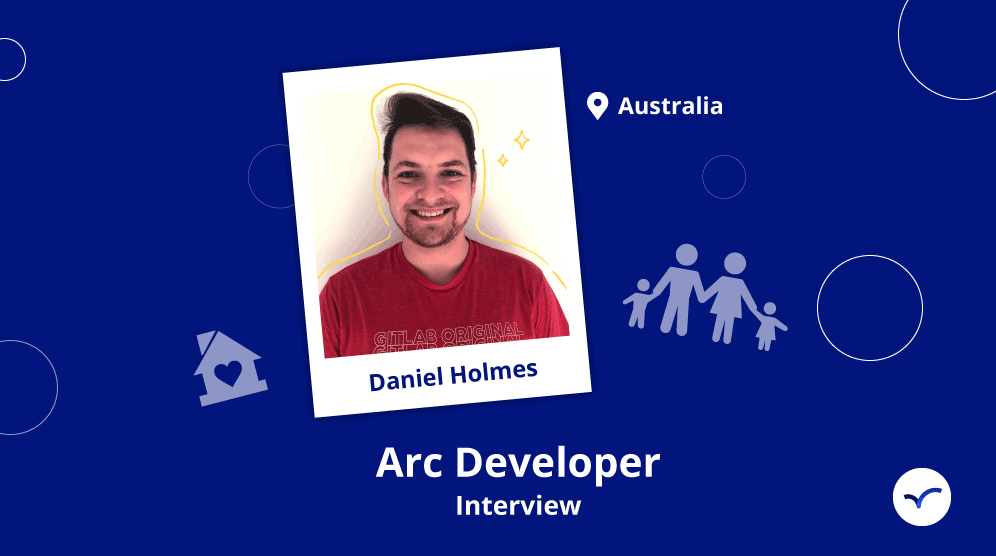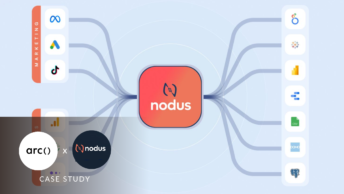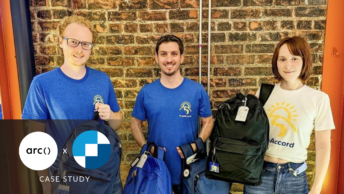Did you know that Arc — in partnership with our friends at Remotive — recently held our first online developer meetup?
During this meetup, we invited Arc Dev Daniel Holmes to share his experiences as a remote developer, and provide information on finding and getting remote jobs.
Looking for top talent fast? See how Arc can help you:
⚡️ Find developers, designers, marketers, and more
⚡️ Freelance or full-time remote + fully vetted
⚡️ Save up to 80% with global hires
Hire top talent with Arc risk-free →
Succeeding as a Remote Developer
During his presentation, Daniel spoke about a number of critical factors when it comes to finding jobs, and succeeding, as a remote developer. Check some of them out below:
- Soft skills are absolutely crucial to your success, especially clear communication, developing (and sticking to!) a routine, and being a self-starter. One of the best ways of developing your soft skills is to be involved in your local community, e.g. through group activities like volunteering.
- Maintaining both your physical and mental health are critical factors for being a successful remote developer.
- Being able to empathize with people when you’re not in the same room is beyond important. Everyone is human!
- Being a great developer isn’t enough on its own! You need to be able to research your own answers to things — Google is your best friend.
- If you’re the “pioneer” of remote working at a company, you have an important role to ensure a great experience for the employees that follow.
- Interviewing the company back is so important. This way, you can:
- Figure out if the company understands that “we’re all human” and life sometimes gets in the way
- Clarify that there is a clear chain of responsibility
- Understand the company’s willingness to have a transparent discussion about hourly rates
- Check that the company has great processes (and makes these clear to the developer)
- Always grow and show your “remote readiness” by doing side projects, contributing to open source projects, and pick up contracts where you can (thereby showing you can work remotely without being prompted to by a boss!).
- If you’re a junior, try to find a senior developer who can mentor you (and don’t forget networking).
- If you’re trying to convince a company to change a non-remote job into a remote job, be flexible in your approach (e.g., offer to travel in for the interview and for a monthly catch-up).
- Think of ways to stand out in the pool of applicants, e.g. having a video on your profile, link to a portfolio, show off your open source project contributions, have a simple/clean personal website, and try to get references on LinkedIn.
If you missed it, don’t worry — there are more online developer meetups in the pipeline!
We thought we’d round out the online meetup by having a chat with Daniel Holmes about his experiences as a remote developer (as well as any last tips).
Let’s go!
Read More: Is Your Developer Ready for Remote Work? 14 Key Interview Questions
You can also try Arc, your shortcut to the world’s best remote talent:
⚡️ Access 450,000 top developers, designers, and marketers
⚡️ Vetted and ready to interview
⚡️ Freelance or full-time
Try Arc and hire top talent now →
Why did you decide to go remote?
I decided to go remote for my wife and kids. I wanted to be a huge part of their upbringing, not someone they saw as a tired, grumpy person on weekends.
What have you learned during the transition from working onsite to working remotely?
The big thing I learned about the transition to remote work is that you are so much more capable, energetic, and efficient in the work you do. Something that might have taken me a month at the office might take me three to five days depending on the situation.
What do you love most about working remotely?
Apart from being an active dad, I love that I am able to set my environment and my hours.
I’m the most productive between the hours of 8 am-12 pm and 9 pm-12 am, so if I have a project that takes a large cognitive toll, I can change my hours up a bit so that I am smashing work out really fast.
What is the biggest challenge you face while working remotely?
My biggest challenge used to be self-motivation; now it tends to be isolation and building rapport with my colleagues. It can take a lot longer to catch each other’s vibes when there’s no sub-verbal communication.
Read More: Here’s How to Motivate & Reward a Remote Engineering Team Effectively
What are the types of remote work? Which one do you prefer?
There are three main types of remote work in my opinion: untethered, geo-fenced, and co-located:
- Untethered means you can work anywhere in the world.
- Geo-fenced means you can work anywhere in a particular country.
- Co-located means you can only work within a short distance of the office.
I prefer “untethered” for two reasons: usually, there’s more pay involved (because it’s often given in a foreign currency that has a better exchange with my home country) and it usually means the company is more open to alternative hours.
What kind of personality better fits remote work?
I don’t think a specific type of person works well with remote work. If I look at say four categories of personalities like Melancholy, Sanguine, Choleric, and Phlegmatic, I would say that predominantly Phlegmatic and Sanguine people would have more trouble acclimating.
That said, I think all personality types fit remote work if they have the right mindset and right company culture.
What soft skills are required as a remote worker?
I think that more soft skills are required for remote work than in-person work. Here’s my go-to list of soft skills I think are critical: empathy, self-discipline, stoicism, self-awareness, writing like you speak, generosity, patience, passion… the list goes on.
Read More: Remote Engineering Team Meetings: 7+ Best Practices for Effective Calls
What kind of business do you look for?
One that values people, and one that values good HR principles. Companies that understand sometimes we have brain fog one day.
Sometimes we wake up feeling down. Sometimes we wake up feeling like we can conquer the world. Sometimes we have to take our family to the doctor. Sometimes we just need a raise (because believe it or not, people have kids, and the cost of living rises) not because we are greedy.
The company needs to understand how people are motivated and provide workers with the three main indicators of happiness in employment: autonomy, mastery, and purpose.
How to gain trust with others in a remote team?
Patience. Be prepared to have to prove yourself by first being great at the small tasks before you can get to the big and exciting ones. Repeat back instructions in your own words and confirm that what you heard and what you understand your task to be is the same thing.
Ask lots of questions and try not to assume anything. Support your fellow coworkers and avoid speaking a bad word about them even if it’s warranted.
Got any tips for an interview for a remote position?
Have a good camera and try to make yourself presentable. Smile, they are just people too. Listen carefully to what is said and where needed repeat back to them what they say in your own words to make sure that you understand what’s being said. Come to the interview with pre-prepared questions.
Smile (seriously, keep doing it), try and know a bit about the company you’re interviewing with, and ask some harder questions of your interviewers like: what’s one thing that you think should make me reconsider working for this company? How do you support employees that have family issues, etc. You’re trying to gauge honesty and people friendliness.
Read More: How to Manage Developers on a Remote Engineering Team
Any advice for junior developers aspiring to get hired for a remote position?
Buddy up with a senior dev if you can. There are lots of experienced senior devs on Twitter who are happy to give free short advice as well. You can also hit me up on Codementor! I am always happy to help out junior devs, and often have two to three juniors working with me at any one time.
How can senior developers who haven’t worked remotely prepare to be more “remote ready”?
Do some freelancing, get some small-time contracts. Build trust with your current organization by working from home one day a week. It takes some serious effort to get the trust and clout needed for a company to have confidence in you for remote work.
Furthermore, you want to be working on your soft skills like empathy, writing as you speak, liberal use of emojis in chats, etc.
Thanks for chatting with us, Daniel!
You can also try Arc, your shortcut to the world’s best remote talent:
⚡️ Access 450,000 top developers, designers, and marketers
⚡️ Vetted and ready to interview
⚡️ Freelance or full-time








